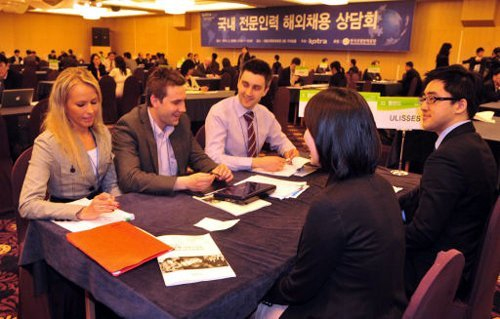 영어토론방 영어토론방 | Home>영어토론방 |
Policy Korea's Brain Drain
페이지 정보

본문

- Korea's Brain Drain Reaches a Grim Level
To the extent Korea is losing its top brains was found to be quite serious, with the significantly higher number of competent individuals leaving Korea than coming in. Hyundai Research Institute (HRI) disclosed in its "Korea's Brain Drain and Possible Countermeasure" report on Tuesday that Korea's think-tank outflow escalated, raising the leakage rate of brilliant individuals.
According to the report, Korea's Brain Drain Index (BDI)-which illustrates overseas demobilization of top brains-Korea had ranked fourth with 7.53 among the total 48 surveyed nations in 1995. The index dropped however, to 4.91 in 2006 and plunged to 40th among the total 60 countries. Closer
the index is to 1, weaker the trend of top brains leaking out of the country.
The net brain gain rate-which indicates inflow of intellectuals into Korea-also worsened. Average net brain gain rate of the 30 OECD member nations increased from 1.0 percent in 1990 to 1.6 percent in 2000, but the rate for Korea dropped from -1.3 percent to -1.4 percent. HRI indicated that while the number of students leaving Korea to study abroad increased rapidly, the inflow of foreign students to Korea to take PhD programs was weak, all contributing to the think-tank "collapse".
The number of students studying abroad showed an average jump of 10.4 percent between 1999 and 2005, but the number of foreigners coming into Korea for PhD programs reached only 10 percent of the 22 OECD member nations' average. The report further explained that the increasing retention rate of science brains in the U.S. was another problem. Of the total number of people who received doctorate degrees in the U.S., the retention rate soared from 20.2 percent between 1992 and 1995 to 46.3 percent between 2000 and 2003.
[Dong-eun Lee / KHS]
[ⓒ Maeil Business Newspaper & mk.co.kr, All rights reserved]
This article is excerpted from Maeil Business Newpaper of 2007.
Source: http://news.mk.co.kr/v3/view.php?year=2007&no=267365
- Few foreigners to be eligible for dual citizenship
By Lee Tae-hoon
Starting Jan. 1 next year, dual citizenship will be given to outstanding foreigners and Koreans under a revised law that is part of the government’sefforts to prevent a brain drain and attract global talent.
However, only a small number of foreign nationals are expected to enjoy the privilege as the government has raised the bar quite high, according to Cha Gyu-geun, director of the Nationality and Refugee Division at the Korea Immigration Service.
Cha said the government has also decided to scrap the proposal for a point system and make the definition of highly skilled professional ambiguous so that a group of 12 government and civic panels will determine who the beneficiaries will be.
Critics say the government’s decision may also leave room for discrimination based on skin color and nationality. South Korea has yet to adopt an anti-discrimination law.
With only a few days left before the law goes into effect, the Immigration Service is not in a position to say who can gain dual Korean citizenship as the government plans to finalize details in a meeting early next year.
The revised law stipulates that even if an applicant is highly talented and deemed qualified for dual citizenship, only those who can contribute to the national interest are eligible. It’s another ambiguous clause that would prompt subjective judgment to play a crucial role.
The Immigration Service will only allow people to file an application in Korea. Cha expects those who have no living experience in Korea will be unlikely to receive the dual citizenship under the “exceptionally talented category” as the screening panel will likely reject them on the grounds that they have yet to illustrate loyalty to Korea.
He says the screening process for dual citizenship would take six months to two years and those seeking the status will have to apply for another visa to stay in Korea during this period.
Cha has asked the Ministry of Justice to consider benchmarking the EB-1 visa, a green card that the United States issues to those with “extraordinary ability in the sciences, arts, education, business, or athletics which has been demonstrated by sustained national or international acclaim and whose achievements have been recognized in the field through extensive documentation.”
Currently, dual citizenship is prohibited and naturalization is allowed only to those who have stayed here for five years or longer or those who are married to Korean nationals and have lived here for at least two years.
This article is excerpted from The KoreaTimes
Source: http://www.koreatimes.co.kr/www/news/nation/2010/12/116_78750.html
Question
1. What do you think about the Brain Drain?
What do you choose if you have chance to work in foreign country?
2. Why talents go to overseas to work?
3. What do you think would be some good ways to decrease Brain Drain?
이 글은「대학연합영어토론동아리」www.pioneerclub.com에서 제공하는 영어토론 정보입니다.
댓글목록
등록된 댓글이 없습니다.

